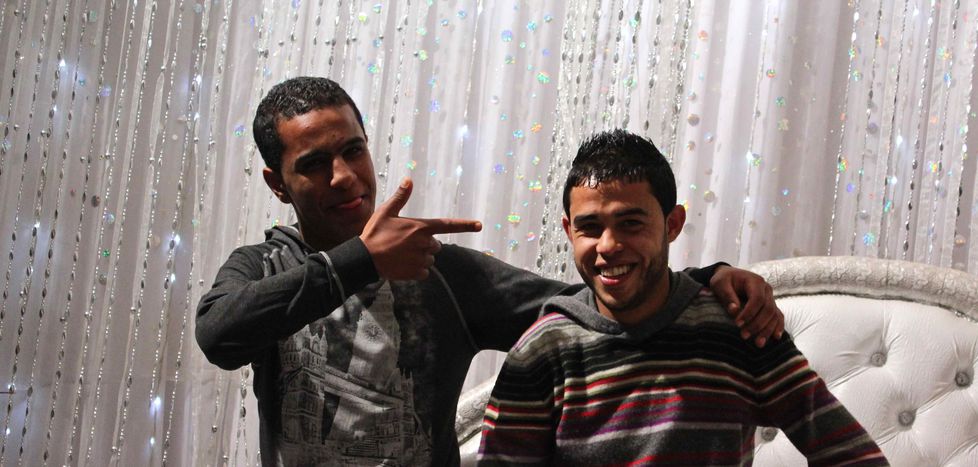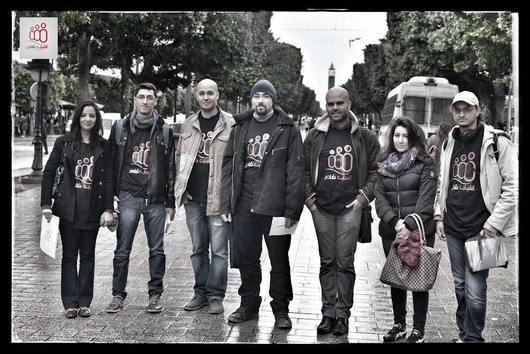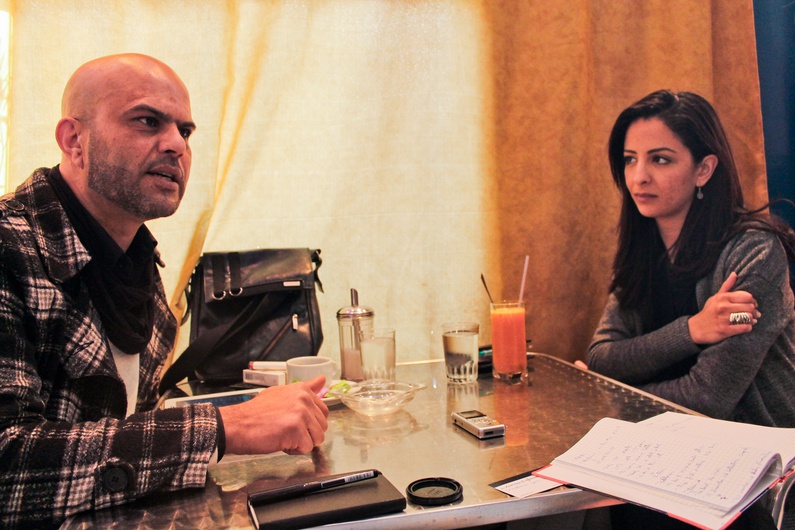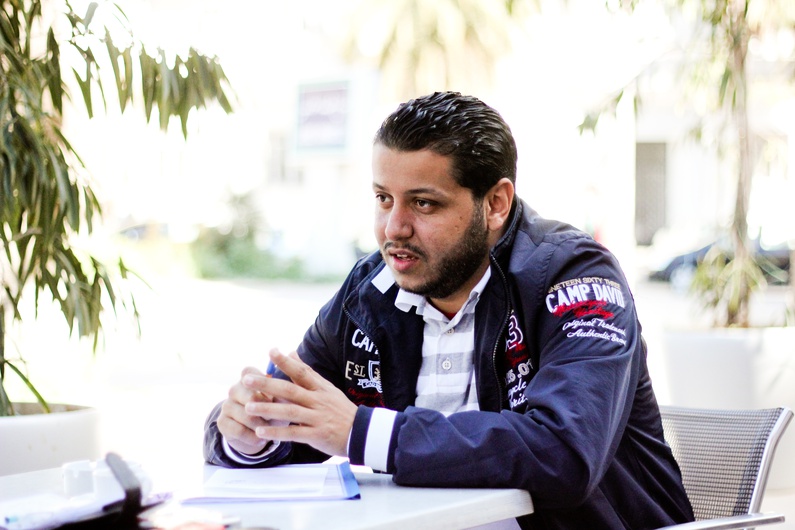
YouthCan, Tunisian Youth's Turn
Published on
Translation by:
Samantha KelloggTunisia's youth are scrambling to leave their ideological differences behind and work together as they did three years ago, when they succeeded in overthrowing Ben Ali's former regime. YouthCan is a new organisation that is trying to unite all of this strength in order to put a stop to Tunisia's real problem of the day: its lack of prospects for youth.
"¿A Cité Ettadhamen?" "No." The cabbie refuses to go to this city, well known for its poverty and marginalisation, which is situated on Tunis' outskirts. Last January, there was heavy rioting there. Demonstrators burned tires to block access to streets and the police had to resort to tear gas to disperse them.
While a second cab is driving there, the motorways get muddy and the butcher's hang animal skin, and the remaining parts that are sold, in their entrances. Hundreds of people work their way up and down and then sit at numerous cafés and tearooms. Hafedh Oueled Saad waits at a zebra crossing. He's 23 years old and has been unemployed ever since he came back to Tunis. He gets coffee and soft drinks for his guests and sits in a room full of white and gold settees. He starts to describe why he decided to illegally emigrate to Italy in 2011.
“Back there in the café, you could find 20 or 25 people that tried to go to Italy, too,” Hafedh explains. After disembarking in Lampedusa, he managed to get to Switzerland, but his European dream came to an end when his asylum application was rejected and he was deported. His hope for the Revolution is already long gone. Hafedh tells us: “I don't mean anything to those politicians, so they don't mean anything to me. I wouldn't say the situation is any better”. He plans to learn Italian to work at a call center, “but I don't think it pays very well”. The first time he fled Tunisia, he paid 1,500 dinares (approximately 725 euros). “Today, if I had the chance, I would do it all over again.”
 The ailing economy and lack of prospects for young people are the biggest threats that still lie ahead for the country's transition to full democracy. Three years have passed since Ben Ali fled to Saudi Arabia, and the new politicians have been unable to find a solution. They're too old and they don't connect with the problems of youth. At least that's what they think at YouthCan, a new non-partisan group that has collected more than 25,000 signatures in a little over a month. Its objective is clear: support young Tunisians, between 20 and 35 years of age, secure decision-making posts at institutions. It doesn't matter what party or ideology they support.
The ailing economy and lack of prospects for young people are the biggest threats that still lie ahead for the country's transition to full democracy. Three years have passed since Ben Ali fled to Saudi Arabia, and the new politicians have been unable to find a solution. They're too old and they don't connect with the problems of youth. At least that's what they think at YouthCan, a new non-partisan group that has collected more than 25,000 signatures in a little over a month. Its objective is clear: support young Tunisians, between 20 and 35 years of age, secure decision-making posts at institutions. It doesn't matter what party or ideology they support.
A Bleak Future
“They can't see any future. I'm going to study. I'm going to study. And then what? That is taken to extremes by somebody who can manipulate their minds. YouthCan's energy is making them aware of their own potential and what they must do.” Mehdi Guebzili is a founding member of the group. He and its president, Besma Mhamdi, speak from l'Étoile Du Nord, a modern coffee shop-bar-bookshop in downtown Tunis. This is where YouthCan organised its first meeting. Back then, there were 70 members, today there are over 4,500 in their closed Facebook group, where there are also members from Italy, France, Germany, and the United Kingdom.
“From the very first moment that YouthCan appeared — Besma explains — it was perfect. It was during the National Dialogue [the ex-Prime Minister, Ali Laarayedh, had resigned and the politicians couldn't agree on appointing a new head of government], when people were really frustrated. We raised hope and optimism at a moment when everything was completely failing.”
Young Tunisians are experiencing uncertain times. They pulled off the Arab Spring and they continued to be at the forefront when Ben Ali sent in the snipers. According to the UN, Tunisians under the age of 24 represent 40% of the population. However, today they face a 30% unemployment rate. And it doesn't matter if they have university degrees: 40% of university graduates are jobless, versus 24% of non-graduates, according to the World Economic Forum. Moreover, they're altogether excluded from institutions. As Mehdi maintains: “Especially for young people, for us, the National Constituent Assembly was a disappointment because they didn't talk about anything. They're not familiar with the problems we experience.”
 YouthCan is still a brand new organisation. It doesn't have an office and the majority of its work is done online, where the movement was spontaneously born. Despite their own doubts in the beginning, the idea is very clear now: train new politicians and reconcile youth with politics. In December 2013, two Tunisian youth (Bassem Bouguerra and Tarek Cheniti) spontaneously sent their resumes over with the objective of serving the government that Prime Minister, Medhi Jomaa, was creating, “free of charge”. During this process, hundreds of young people explain their motivations on social network sites to become, in less than 24 hours, YouthCan's most prominent showcase. “Bassem Bouguerra shared his resume on Facebook, offering his help to the Ministry of Home Affairs. I saw it and I contacted him, just like everyone else did,” he remembers. “All we knew was that we didn't want to be a traditional political party,” adds Besma. Their objective is long-term, but there's no time to waste. The first project will be for the upcoming elections, planned for the end of 2014. 200 candidates will be trained for them. “Young people powered by young people, training them in public speaking, introducing themselves to one another, finding financing...”
YouthCan is still a brand new organisation. It doesn't have an office and the majority of its work is done online, where the movement was spontaneously born. Despite their own doubts in the beginning, the idea is very clear now: train new politicians and reconcile youth with politics. In December 2013, two Tunisian youth (Bassem Bouguerra and Tarek Cheniti) spontaneously sent their resumes over with the objective of serving the government that Prime Minister, Medhi Jomaa, was creating, “free of charge”. During this process, hundreds of young people explain their motivations on social network sites to become, in less than 24 hours, YouthCan's most prominent showcase. “Bassem Bouguerra shared his resume on Facebook, offering his help to the Ministry of Home Affairs. I saw it and I contacted him, just like everyone else did,” he remembers. “All we knew was that we didn't want to be a traditional political party,” adds Besma. Their objective is long-term, but there's no time to waste. The first project will be for the upcoming elections, planned for the end of 2014. 200 candidates will be trained for them. “Young people powered by young people, training them in public speaking, introducing themselves to one another, finding financing...”
YouthCan's members are spread throughout the country. Yazidi Boulbeba is one of them. He lives in Siliana, a small, rural, farming community in Tunis' interior. A diploma in Physics and Chemistry hasn't been enough for this 28 year old youth to find work. He takes part in a political party, but when he saw an opportunity to join YouthCan, he didn't hesitate. “The youth had a Revolution for three reasons: dignity, freedom and jobs. Freedom is the best, but there will be no dignity without jobs.” He likes YouthCan's concept of training new politicians and he believes that this platform can bring young people and politics together. “I hope so, because this is the youth's political boycott.”
In Siliana, poverty is on the rise. “There's only one factory in the province and the crops we grow are processed in other cities.” As a result, a lot of people go to more prosperous regions. “The second alternative is extremism and terrorism. Nearly every terrorist is from the county's poorest regions,” Yazidi confesses.
THIS ARTICLE IS PART OF A SPECIAL CAFEBABEL EDITION ON CASABLANCA CARRIED OUT AS PART OF THE EUROMED REPORTER PROJECT, INITIATED BY CAFEBABEL IN PARTNERSHIP WITH I-WATCH, SEARCH FOR COMMON GROUND AND THE ANNA LINDH FOUNDATION. YOU CAN FIND ALL THE ARTICLES ON THIS SUBJECT ON THE FRONT PAGE OF THE MAGAZINE.


Translated from Youthcan, El turno de la juventud tunecina



